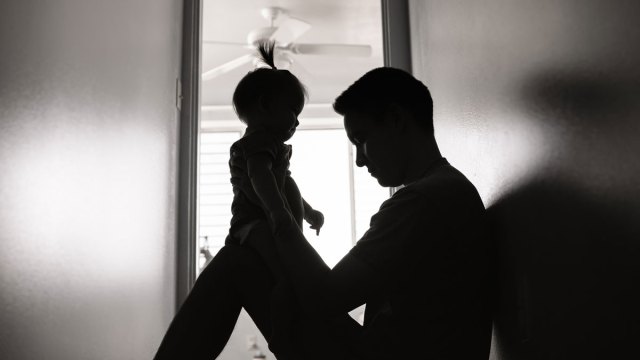When my husband mobilized in the fall of 2020, I thought the hardest part was going to be surviving his absence. A year-long deployment was hard, but a year-long deployment solo-parenting three kids ranging in age from nine months to nine years during the height of the pandemic was an absolute nightmare.
In January of 2021, my husband was exposed to COVID-19 on base. He was only 34 and had no underlying health conditions. If he got sick, we reasoned, he would likely be okay.
But the next day, when his test came back positive, a new nightmare began. Months of complications followed: a suspected TIA (transient ischemic attack, or “mini” stroke), post-COVID pneumonia, and pericarditis. He was repeatedly sent to the emergency room with heart attack-like symptoms and felt like his brain was shrouded in fog.
A year after departing and 10 months after getting sick, my husband returned home with debilitating long COVID—and our family hasn’t been the same since.
Before he fell ill, my husband was juggling work as an ICU nurse, graduate school, his military service, and family life. Now, we are just trying to survive each day.
Everything from brushing his teeth to taking a phone call saps his energy. The basement stairs leave him winded, and he experiences constant chest pain. If something is burning or if a diaper needs to be changed, he can’t tell, because he never regained his sense of smell.
We plan our days and activities around rest needs, appointments, and current symptoms. There is no predicting which days will be tolerable and which ones will be terrible.
Our kids—ages two, five, and 11—have different levels of understanding about his illness (and different frustrations about the fall-out), and we’ve explained things to each one as best we can based on their developmental stage.
When my husband is too exhausted to play or we have to change our plans when his symptoms flare, the kids often get upset, but (in the thinnest of silver linings) they are also developing greater empathy, learning how to support others, and building resiliency. We also try to carve out one-on-one time with them as we are able so they don’t get totally lost in the chaos.
Related: No One Tells You About the Guilt You’ll Experience as a Mom with Chronic Illness
The truth is, my husband and I can no longer divide and conquer the work of parenting, bread-winning, and house management like before. As desperately as he wants to help me by carrying more of the load, he simply can’t, and that was a devastating realization for both of us.
After a year on my own with the kids during the pandemic, separated from family and friends and trying to work with constantly quarantined children, I was aching for some of the burden to be lifted. I remain overwhelmed, and there is no end in sight.
Perhaps the most frustrating part is that there is no clear path forward; the lack of uncertainty and clarity around treatments and prognosis for long COVID patients is bewildering. It’s unsettling to not have a timeline or any clear direction in terms of his care.
Over time, we have found some tools and tactics that have been helpful as we all adjust to life with long COVID:
- Honesty. We have done our best to be honest and straightforward with our kids about what he is going through. Everyone does better when we communicate openly..
- Counseling. Long COVID turned our life upside down, and we have an amazing family counselor who has helped us process and adapt, as well as better support our kids.
- Letting things go. Our house is not the cleanest, sandwiches and cereal are a regular part of our dinner rotation, and many times we just don’t get the things we want and need to done. At the end of the day, we’re doing the best we can, and we’ve worked hard to be okay with that.
- Accepting and seeking help when needed. When a mom from daycare bought us a pizza dinner during the deployment, when our neighbors sent their teenagers over to help with shoveling snow last winter, and when another neighbor offered to help with a grocery pick-up order during a particularly stressful time, we gratefully accepted.
- Acknowledging that our situation feels impossible while also trying to maintain a sense of humor. My husband and I have a running joke that we repeat to each other daily: “It won’t always be like this.” Things could always get worse, and sometimes they do, but this phrase helps us remember that the kids will get older, he will hopefully make gains with his health, and everyday life won’t always feel so unimaginably hard.
We don’t know if or when my husband will start to feel better, but we try to remain hopeful. We are also focusing on everything we’re grateful for: He is alive, he is finally home, and we are all together as a family.











